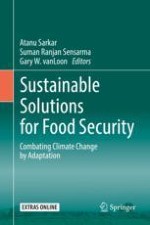2019 | OriginalPaper | Buchkapitel
18. Stakeholders’ Perceptions on Effective Community Participation in Climate Change Adaptation
verfasst von : Subhajyoti Samaddar, Akudugu Jonas Ayaribilla, Martin Oteng-Ababio, Frederick Dayour, Muneta Yokomatsu
Erschienen in: Sustainable Solutions for Food Security
Aktivieren Sie unsere intelligente Suche, um passende Fachinhalte oder Patente zu finden.
Wählen Sie Textabschnitte aus um mit Künstlicher Intelligenz passenden Patente zu finden. powered by
Markieren Sie Textabschnitte, um KI-gestützt weitere passende Inhalte zu finden. powered by
